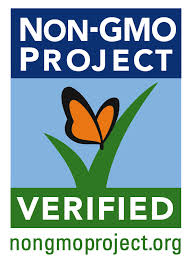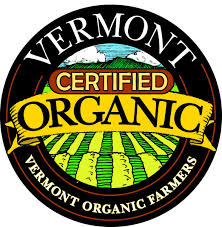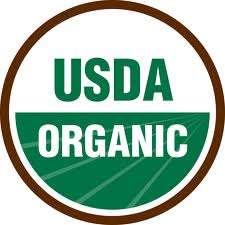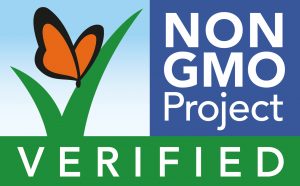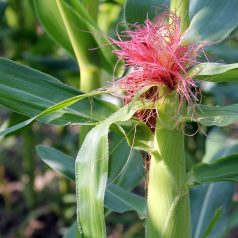
Celebrating Non-GMO Month
This October, our Co-op joins over 13,000 other participating grocery retailers across North America in celebrating the 9th annual Non-GMO Month. Created by the Non-GMO Project, this month-long celebration spotlights shoppers’ rights to choose food and products that do not contain genetically modified organisms (GMOs). In our Co-op this week, you’ll find a weekly sale featuring a handful of our favorite GMO-free products, plus a coupon in the Addison Independent for $3.00 off any Non-GMO Verified food.
What Are GMOs?
A GMO, or genetically modified organism, is a plant, animal, microorganism or other organism whose genetic makeup has been modified in a laboratory using genetic engineering or transgenic technology. This creates unstable combinations of plant, animal, bacterial and virus genes that do not occur in nature or through traditional crossbreeding methods. The two main traits of GMO plants include glyphosate-based herbicide tolerance (Roundup Ready®), and the ability for a plant to produce its own pesticide.
Are GMOs Safe?
There is no scientific consensus on the safety of GMOs. According to a 2015 statement signed by 300 scientists, physicians and scholars, the claim of scientific consensus on GMOs frequently repeated in the media is “an artificial construct that has been falsely perpetuated.” To date, there have been no epidemiological studies investigating potential effects of GMO food on human health.
A comprehensive review of peer-reviewed animal feeding studies of GMOs found roughly an equal number of research groups raising concerns about genetically engineered foods and those suggesting GMOs were as safe and nutritious as conventional foods. The review also found that most studies finding GMOs foods the same as conventional foods were performed by biotechnology companies or their associates.
For a comprehensive overview of the available research on GMOs, please download the report “GMO Myths & Truths” published by three leading researchers at Earth Open Source.
More than 60 countries around the world – including Australia, Japan, and all of the countries in the European Union – require GMOs to be labeled. Globally, there are also 300 regions with outright bans on growing GMOs.
How Common Are GMOs?
GMOs are present in the vast majority of processed foods in the US. Currently, commercialized GM crops include soy, cotton, canola, sugar beets, corn, papaya, zucchini, and yellow squash. Products derived from these GM crops include amino acids, alcohol, aspartame, ascorbic acid, sodium ascorbate, citric acid, sodium citrate, ethanol, flavorings (“natural” and “artificial”), high-fructose corn syrup, hydrolyzed vegetable protein, lactic acid, maltodextrins, molasses, monosodium glutamate (MSG), sucrose, textured vegetable protein (TVP), xanthan gum, vitamins, vinegar, and yeast products.
How Do GMOs Affect The Environment?
Over 80% of all GMOs grown worldwide are engineered for herbicide tolerance. As a result, use of toxic herbicides like Roundup® has increased 15-fold since GMOs were introduced. GMO crops are also responsible for the emergence of resistant super weeds and super bugs which can only be killed with ever more toxic poisons like 2, 4-D (a primary ingredient in Agent Orange). These chemicals also pose a threat to beneficial insects like pollinators, which are critical to much of our food supply.
In March 2015, the World Health Organization determined that the herbicide glyphosate (the key ingredient in Roundup®) is “probably carcinogenic to humans.”
GMOs are a direct extension of chemical agriculture and are developed and sold by the world’s biggest chemical companies. It’s also important to note that the companies who produce these chemicals are also the same companies developing the GMO crops that require their use. The long-term impacts of GMOs are unknown, and once released into the environment, these novel organisms cannot be recalled.
How Do GMOs Affect Farmers?
Because GMOs are novel life forms, biotechnology companies have been able to obtain patents which restrict their use, banning farmers from saving, replanting, exchanging, and selling seeds as they have done for millennia and upon which their livelihoods depend. As a result, the companies that make GMOs have the power to sue farmers whose fields become contaminated with GMOs, even when it is the result of inevitable drift from neighboring
fields. GMOs, therefore, pose a serious threat to farmer sovereignty and national food security. They also pose a threat to an organic farmer’s organic certification status. As a result, many organic farmers fear for their livelihood and their ability to fill consumer desire for organic products.
An additional threat to food security is posed by GMO crops because their seeds are identical clones lacking genetic variation. As GM crops become increasingly common, this narrow germplasm leaves the world with severely
limited crop diversity. When drought, flooding, blight, or another source of plant disease comes along, this lack of diversity leaves us vulnerable to large-scale crop collapse.
Are GMOs Labeled?
An overwhelming majority of consumers in Vermont and across the US have long been rallying for clear, simple, on-package labeling so that they can know at a glance if a product was produced with genetic engineering. In July of 2016, Vermont became the first state to make it happen as our groundbreaking GMO labeling law went into effect. The law required mandatory labeling of food for retail sale if produced with genetic engineering (GE) and banned the use of the label “natural” for food made with GE ingredients. The rollout was off to a smooth start and it felt like a significant victory for transparency in food labeling and consumers’ right to know.
Unfortunately, our celebration was short-lived. Senators Pat Roberts (R-KS) and Debbie Stabenow (D-MI) proposed a compromise GMO labeling bill (S.764) nicknamed the DARK (Denying Americans the Right to Know) Act. Vermont’s leaders fought hard to defeat the DARK Act as it moved through the House and Senate but despite their best efforts, the proposal passed both the Senate and the house. It was delivered to the White House on July 19th and was signed into law shortly thereafter. In a nutshell, this law dissolved Vermont’s labeling law and falls well short of consumer expectations.
This law leaves a significant number of GE products unlabeled due to a definition of GE food which ultimately excludes some sugars, oils, and corn products. Companies are also able to opt out of clear, accessible on-package labeling by using digital “QR” codes that are unreadable by approximately half of rural and low-income Americans without access to smartphones or cell service. There are no penalties for lack of compliance, and no authority to recall products that are not properly labeled.
We’re deeply disappointed to see Vermont’s strong labeling law replaced by the DARK Act, but we also recognize that we should all be incredibly proud of what we accomplished over the past few years. Today, if you go into grocery stores in Vermont and across the nation you will find genetically engineered foods labeled for the first time – Vermont was a driving force in making that happen! National food manufacturers like Campbell’s and Dannon announced that they will continue to label their products, and others are expected to follow suit. In the end, a lot more people know what is in their food because of what we managed to accomplish here in Vermont.
Avoiding GMOs at the Co-op
The fight for meaningful and clear food labels will continue. In the meantime, if you wish to avoid GMOs while shopping in the Co-op, look for products bearing a certified organic label and/or products bearing the third-party certification of the Non-GMO project. Ask questions about where food comes from and how it is made. Perhaps the product has been imported from one of the 60-plus countries around the world that have banned GMOs. Or, perhaps it’s a local product from a small farmer or producer that may not bear an organic or non-GMO label, but can assure you that their products are grown or produced without the use of GMOs.
